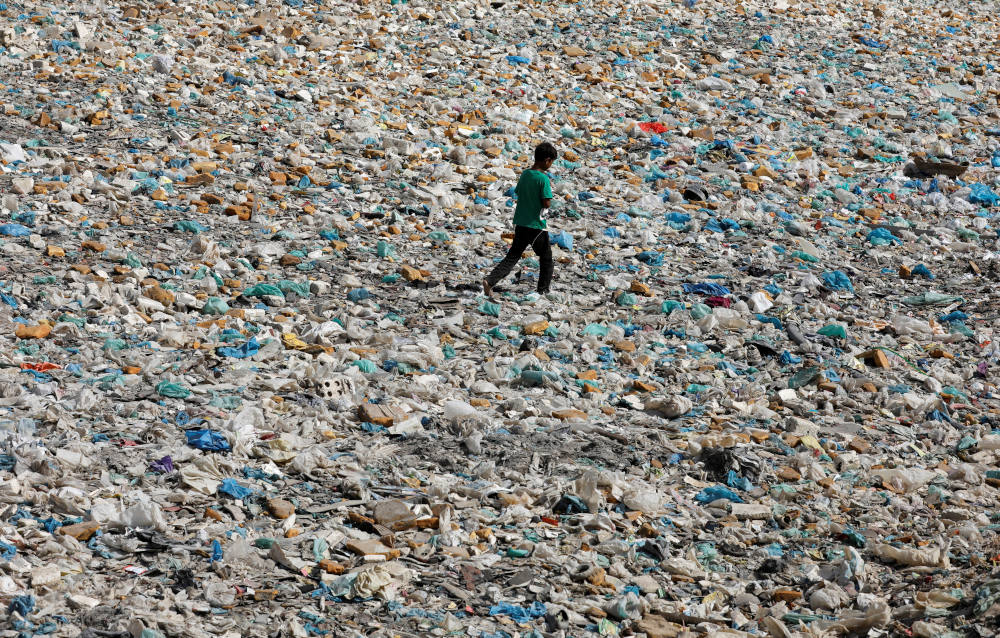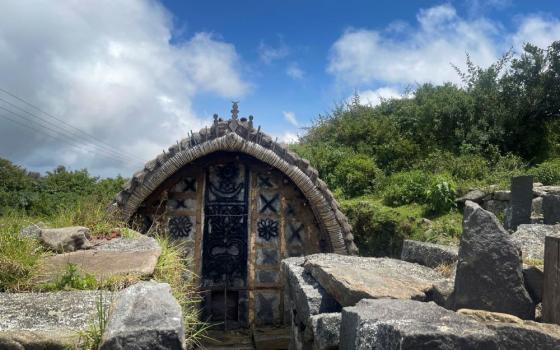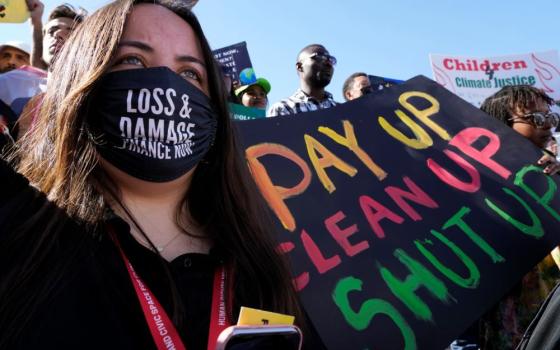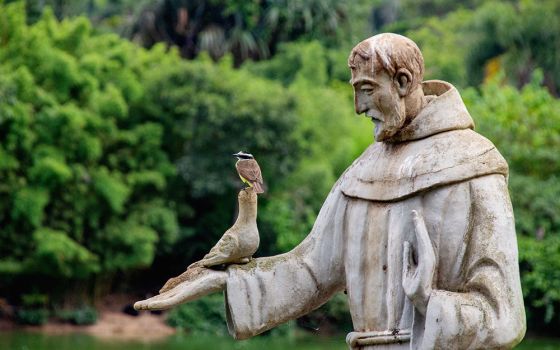
A boy walks over a drainage channel littered with garbage in Karachi, Pakistan, on Earth Day April 22, 2020. (CNS photo/Akhtar Soomro, Reuters)
Welcome to Burning Questions, the EarthBeat feature that takes on those questions smoldering in your mind about climate change and religion — from the basics to more complex, and everything in between. Have a Burning Question of your own? Let us know.
In October, the Amazon synod highlighted for the Catholic Church the many challenges facing the Amazon rainforest, one of the most critical ecosystems for sustaining life on this planet.
It also brought into wider focus the idea of "ecological sin," which is the subject of our latest Burning Question. And a straightforward one at that: "What exactly is ecological sin?"
Let's cut to the chase. What does ecological sin mean, and what does it look like?
A good starting spot is the definition proposed at the conclusion of the Vatican's synod of bishops on the Amazon.
That gathering's final document described ecological sin this way:
"We propose to define ecological sin as an action or omission against God, against one's neighbor, the community and the environment. It is sin against future generations, and it is committed in acts and habits of pollution and destruction of the harmony of the environment. These are transgressions against the principles of interdependence, and they destroy networks of solidarity among creatures and violate the virtue of justice."
Under that definition, small acts like littering and overconsuming, or larger things such as cutting down forests or dumping toxins into rivers and lakes all could be considered sinful. It also calls into question the indirect consequences of things like single-use plastics, which have a profound impact on ecosystems.
Theologians who have examined ecological sin say this definition reinforces the idea that humans are a part of nature — God's creation — and not separate from it.
"Ecological harms are not something that happens to our environment, 'out there,' as if it is separate from human existence," said Celia Deane-Drummond, director of the Laudato Si' Research Institute at Oxford University's Campion Hall. Rather, it exists often within situations of injustice.
Megan Clark, a moral theologian at St. John's University, says calling environmental destruction a sin "reminds us that God is involved."
"Talking about it as ecological sin makes sure that we keep front and center that it is isn't just that we may be destroying or harming the natural world," she said — for instance, destroying the rainforest and with it, the homes of indigenous communities — "but it's that this breaks our relationship with God."
By recognizing this as ecological sin, Clark added, "It's a way of refocusing that ultimately the natural world does not belong to us but belongs to the Creator."
What else should I know?
Theologians say that ecological sin highlights the relational aspect of sin. People tend to think of sin as something against God or against other people. But ecological sin shows how the relationship can also be broken with the natural world, too.
In his encyclical "Laudato Si', on Care for Our Common Home," Francis pushed back against interpretations of dominion in the Book of Genesis as giving humans free reign for "unbridled exploitation of nature," writing "the Bible has no place for a tyrannical anthropocentrism unconcerned for other creatures." The pope cited the Catechism of the Catholic Church in stating "each creature possesses its own particular goodness and perfection."
That means God made each creature with an intentional purpose outside its utility to humans, said Jesuit Fr. Christopher Steck, a theologian at Georgetown University and author of All God’s Animals: A Catholic Theological Framework for Animal Ethics.
"When we do things that act against God's goal for that creature, we sin against God, of course. But we're also doing an injustice against them. We're doing something that prevents what God had hoped for that creature," he said.
Another core piece to understanding ecological sin is looking at it not just through personal actions but also its social dimensions.
Social, or systemic, sins are those within societal structures that can oppress people, violate human dignity and freedom, or cause inequality. By nature, they are collective. Racism is one example.
Viewing ecological sin as a social sin means becoming aware of how different aspects of lifestyles cause harm to the land, biodiversity and other people, said Tobias Winright, a moral theologian at St. Louis University.
For instance, dependence on fossil fuels creates the greenhouse gas emissions that drive global warming. Or consumption habits, like meat-heavy diets and tech devices, where the processes involved in producing such goods can damage nature and communities — whether deforestation in the Amazon or extractive mining in parts of Africa and the Philippines.
"We're already entangled and enmeshed in these structures and systems. And that's sin, too, even if it's not always volitional on the part of the individual," Winright said.
Reflecting on ecological sin can help Catholics recognize how certain actions, complicit or not, have consequences for the created world. It also raises to the forefront what virtues the church is calling Catholics to live out.
"So the question that a Catholic Christian has to ask is not only how can I avoid sin, but how can I become the person that Christ is calling me to be?" Steck said.
How new is 'ecological sin'? It seems it just came up recently.
Good question.
The term itself may be fairly novel for many Catholics, but the concept behind it has been prevalent for some time.
Indeed, the Amazon synod brought the phrase "ecological sin" more widely into the Catholic conversation. Before then, it has been mostly framed in terms of the need to refrain from damaging the environment, Deane-Drummond said. And church teaching more generally on creation care dates back centuries. (Think St. Francis of Assisi.) Deane-Drummond said as environmental consciousness gained traction in the 1970s --- in the wake of the first Earth Day celebration --- so too did it elevate in discussions of Catholic social teaching.
Advertisement
In 1988, the Philippine bishops wrote in a pastoral statement that people "have sinned against God and His Creation" through development that had eroded riverbanks, poisoned cropland, uprooted forests and destroyed coral reefs and mangroves.
"As we reflect on what is happening in the light of the Gospel we are convinced that this assault on creation is sinful and contrary to the teachings of our faith," they wrote.
In his 1990 World Day of Peace Message, Pope St. John Paul II said that "an education in ecological responsibility is urgent," and that "Christians, in particular, realize that their responsibility within creation and their duty toward nature and the Creator are an essential part of their faith."
Along with citing the writings of past popes, saints and more than a dozen bishops' conferences, Francis in Laudato Si' references teachings from the Orthodox Church on sins against creation. Specifically, he quotes from a 1997 speech delivered by Ecumenical Patriarch Bartholomew, aka "the Green Patriarch":
"It follows that to commit a crime against the natural world is a sin. For humans to cause species to become extinct and to destroy the biological diversity of God’s creation, for humans to degrade the integrity of Earth by causing changes in its climate, by stripping the Earth of its natural forests or destroying its wetlands, for humans to injure other humans with disease, for humans to contaminate the Earth’s waters, its land, its air, and its life with poisonous substances — these are sins."
He explained that humans' responsibility for God's creation came with "an ascetic element," or "a voluntary restraint in order for us to live in harmony with our environment." That didn't mean retreating from society or technological advances, he said, "but a communal attitude of mind and way of life that leads to the respectful use, and not the abuse, of material goods," and preserving them for others and future generations.
"Consuming the fruits of the Earth unrestrained, we become consumed ourselves, by avarice and greed," Bartholomew said.
A couple years after that speech, in 2002, Bartholomew and John Paul II issued a joint statement on environmental ethics that framed environmental degradation in moral and spiritual terms, as well as economic and technological ones.
So if the Amazon synod simply proposed a definition, does that mean it's not official?
Just weeks after the Amazon synod ended, Francis said that discussions were under way to update the Catechism to include ecological sin in the church's official teaching.
Here's the line: "We must introduce — we are thinking about it — in the Catechism of the Catholic Church the sin against ecology, the ecological sin against the common home, because it is a duty."
Francis made the comment during a gathering on criminal law at the Vatican. During that meeting, he urged the international justice community to recognize among the four crimes against peace (crimes against humanity, genocide, war crimes, crimes of aggression) a fifth area: ecocide. The pope explained ecocide as "the massive contamination of air, land and water resources, the large-scale destruction of flora and fauna, and any action capable of producing an ecological disaster or destroying an ecosystem."
Theologians say adding ecological sin to the Catechism is significant, in that it places the church's magisterial weight behind it and signifies that caring for creation is an essential part of the faith.
It could become a key element to unlocking the ecological conversion that Francis has said is necessary to compel greater protection of the common home that is Earth.
"It finally becomes something that can no longer be seen as a marginal teaching that we can ignore," said the Jesuit priest Steck. "… This is something that is central to the church's moral teaching, central to the church's expectations of what it means to live as a Christian witnessing to the kingdom."
[Brian Roewe is an NCR staff writer. His email address is broewe@ncronline.org. Follow him on Twitter: @BrianRoewe.]






